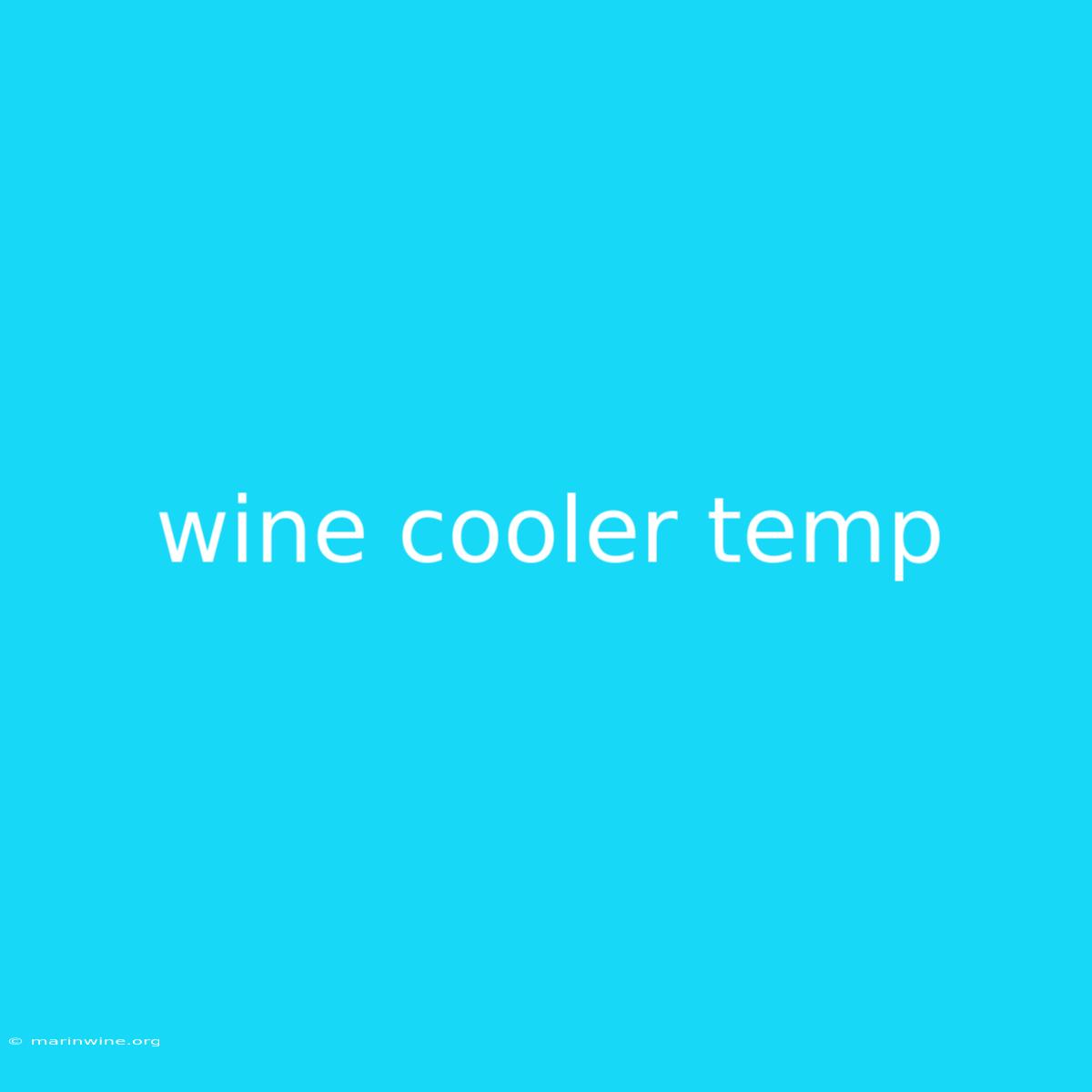What’s the Ideal Wine Cooler Temperature? 🍷 Uncorking the Secrets to Preserving Your Precious Bottles
Have you ever wondered why your wine doesn't taste quite as good as it should? It might be because it's not stored at the right temperature! Maintaining a consistent wine cooler temp is crucial for preserving the flavor, aroma, and longevity of your favorite vintages.
Why It Matters:
This article will guide you through the essential elements of wine storage temperatures and how to maintain the perfect environment for your collection. We'll cover:
- The ideal wine cooler temperature for various types of wine.
- How temperature affects the aging process of wine.
- Practical tips for choosing and maintaining your wine cooler.
- Common misconceptions about wine storage.
Key Takeaways of Wine Cooler Temperature:
| Wine Type | Ideal Serving Temperature (Celsius) | Ideal Storage Temperature (Celsius) |
|---|---|---|
| Sparkling Wines (Champagne, Prosecco) | 6-8°C | 10-12°C |
| White Wines | 8-12°C | 10-12°C |
| Red Wines | 14-18°C | 12-15°C |
| Dessert Wines | 10-12°C | 10-12°C |
Wine Cooler Temperature: Understanding the Basics
The ideal wine cooler temperature is a crucial factor in preserving the delicate balance of flavors and aromas within a bottle. Here's why:
1. Temperature and Aging:
- Slowing Down the Aging Process: Cooler temperatures slow down the chemical reactions that occur during wine aging, preserving the fruit flavors and aromas. This is especially important for long-term storage.
- Preventing Oxidation: High temperatures accelerate oxidation, causing the wine to deteriorate and lose its vibrancy.
2. Temperature and Serving:
- Optimizing Flavor: Each wine has an ideal serving temperature that allows its specific aromas and flavors to fully express themselves.
- Balancing Acidity and Tannins: Temperature affects the perception of acidity and tannins, making it crucial to serve wines at their optimal temperature for a balanced taste experience.
Temperature Variations and Wine Types
1. Sparkling Wine (Champagne & Prosecco):
- Serving Temperature: 6-8°C (43-46°F)
- Storage Temperature: 10-12°C (50-54°F)
- Why It Matters: Cold temperatures help to preserve the delicate bubbles and refresh the palate with the sparkling wine's acidity.
2. White Wine:
- Serving Temperature: 8-12°C (46-54°F)
- Storage Temperature: 10-12°C (50-54°F)
- Why It Matters: Cooler temperatures highlight the fruit flavors and maintain the crispness of the wine.
3. Red Wine:
- Serving Temperature: 14-18°C (57-64°F)
- Storage Temperature: 12-15°C (54-59°F)
- Why It Matters: Serving red wine at a slightly warmer temperature allows the tannins to soften and the fruit flavors to blossom.
4. Dessert Wine:
- Serving Temperature: 10-12°C (50-54°F)
- Storage Temperature: 10-12°C (50-54°F)
- Why It Matters: Maintaining a stable temperature is crucial for preserving the sweetness and delicate balance of these luscious wines.
Maintaining the Ideal Wine Cooler Temperature: Tips and Tricks
1. Choose the Right Wine Cooler:
- Size: Select a cooler that's the right size for your collection.
- Temperature Zones: Consider a cooler with multiple temperature zones if you store a variety of wines.
- Features: Look for features like humidity control, vibration reduction, and UV protection.
2. Placement:
- Avoid Direct Sunlight: Sunlight can damage your wine.
- Away from Heat Sources: Keep the cooler away from ovens, stoves, or any other heat sources.
3. Calibration:
- Regular Checkups: Check the temperature of your wine cooler regularly and adjust as needed.
- Use a Thermometer: A dedicated wine cooler thermometer provides accurate readings.
FAQ: Uncorking the Myths
Q: Can I store wine in the refrigerator?
A: While the refrigerator can keep wine cool, it's not the ideal environment. The humidity levels are often too high, and there's a risk of unwanted flavors being absorbed from other foods.
Q: What happens if the temperature fluctuates?
A: Temperature fluctuations can affect the wine's aging process and create unwanted oxidation. This can lead to premature aging and loss of flavor.
Q: Can I store wine in a wine cellar?
A: A wine cellar is ideal for long-term wine storage, offering optimal temperature and humidity control.
Tips for Maintaining Your Wine Collection
1. Store Bottles Horizontally: This keeps the cork moist and prevents oxidation.
2. Avoid Vibration: Excessive vibration can disrupt the aging process.
3. Minimize Exposure to Light: Light can cause oxidation and damage the wine.
4. Don't Overfill the Cooler: Allow for air circulation around the bottles.
5. Clean Regularly: Remove any dust or debris from the cooler's interior.
Summary:
The ideal wine cooler temperature is key to preserving the quality and flavor of your cherished wines. By understanding the basics of temperature control, selecting the right cooler, and following these tips, you'll enjoy the perfect taste of every sip.
Closing Message: Investing in a reliable wine cooler is an investment in your passion for wine. It's a commitment to enjoying the fruits of your labor and the satisfaction of knowing your precious bottles are aging gracefully.

